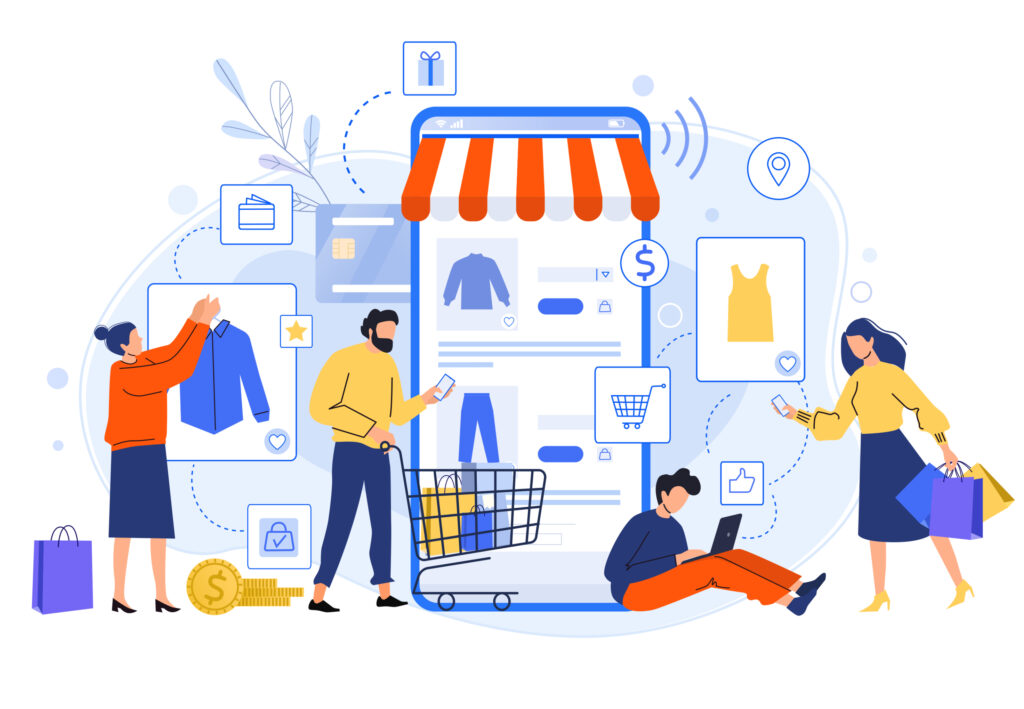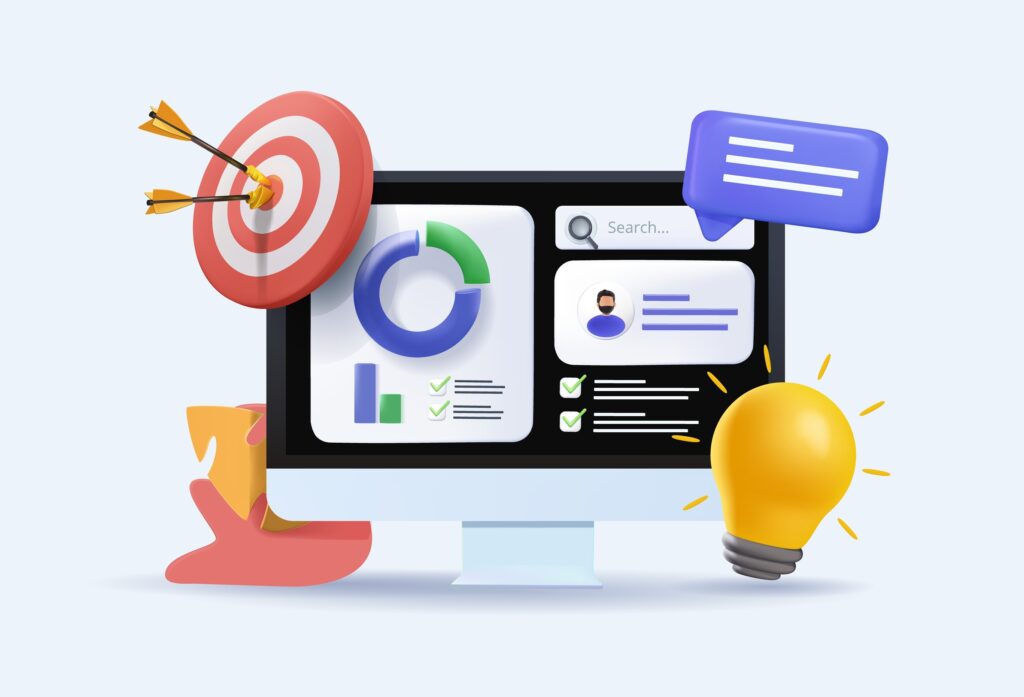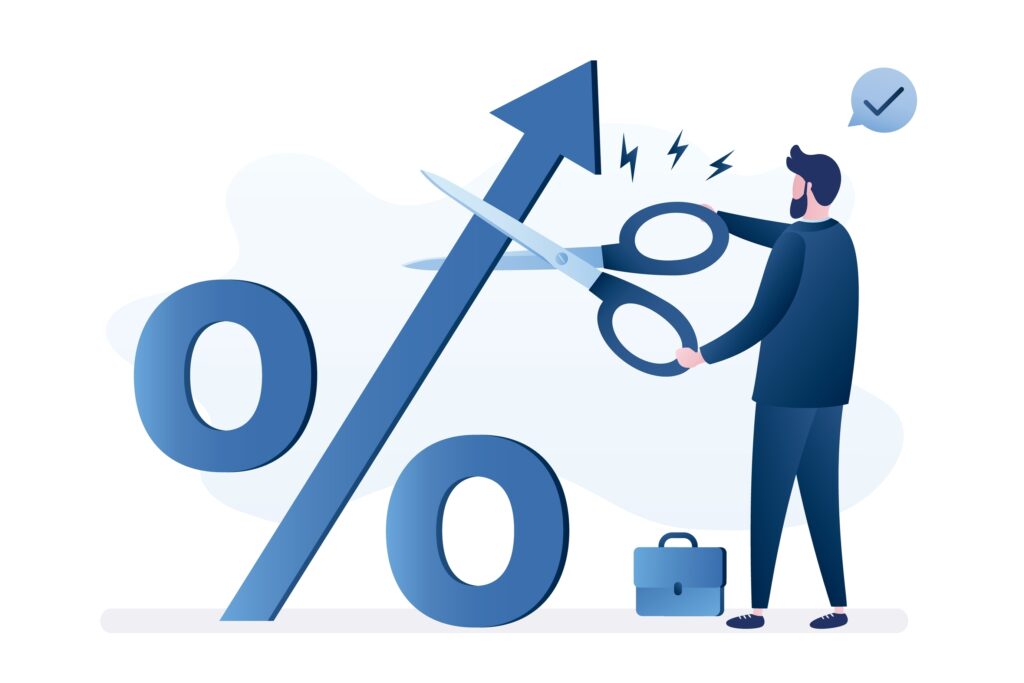The ecommerce market in 2023 continues to expand. Ecommerce owners need to be aware of the changes happening in their market.
In this article, we’ll give you an overview of the 2023 ecommerce trends as well as specific trends to watch out for.
Let’s get started.

Overview of ecommerce trends for 2023
The ecommerce market was valued at $16.6 trillion (USD) in 2022. This number is expected to grow significantly in the next few years. Analysts have projected that the compound annual growth rate for 2023 to 2028 will be 27.43%.
Many existing trends from recent years will continue to stay relevant with even more growth in 2023.
Areas like payment options, mobile shopping and personalization are some of the existing trends that will continue to grow. New trends emerging for 2023 are social commerce, inflation, sustainability and AI.
The growth in ecommerce is exciting for those who operate online. $16.6 trillion is a big market to find success in. By knowing these trends for 2023 it will help you prepare for the consumer’s new expectations and will guide you in staying competitive in the market.
7 Ecommerce trends for 2023
Ecommerce has seen rapid growth over the last decade, with even more growth in these last few years. Ecommerce owners need to stay up to date to remain competitive and give their customers a great experience.
Here are the top trends for 2023.
1. Mobile Shopping
Mobile shopping is no surprise as a 2023 trend. Customers using mobile devices to shop has continued to grow year after year – people like using their phones, it’s easier and already in their pocket.
Even following Google’s search algorithms, websites need to be optimized properly in order to continue ranking. In 2021 mobile usage was at 54% and in 2023 this number is projected to be at 61%.
Focusing on shopping with mobile devices the statistics are even more surprising. In 2021 42% of ecommerce sales were through a mobile device, however, in 2022 this number rose to 43%, with expectations to be even higher in 2023
The trends of mobile shopping for 2023 are something ecommerce owners need to keep in mind. Everything on your website needs to function properly on mobile.
Ecommerce owners should check every sales funnel and customer journey path to ensure everything is optimized for mobile. You’ll be adhering to customers and to the Google search results page.

2. More payment options
Different payment methods have continued to come forward over the last couple of years. We’ll continue to see an increase in emerging payment options for 2023.
Customers want easier and quicker payment methods for shopping online. The rise in Apple pay, Google Pay, and other mobile payments have made this more common.
In 2021, 50% of ecommerce transactions were paid using a mobile wallet – this number will reach 53% in 2025.
Other payment methods such as cryptocurrencies will also continue to gain popularity. A report done by CNBC in 2022, found that nearly 75% of retailers plan to accept crypto payments. These are every type of company too, from Starbucks to Lamborghini.
The more payment options for 2023 means ecommerce owners will have to adapt and be flexible in taking payments.
Businesses that risk not offering these new payments may see a loss in sales. Customers will choose another option with their preferred payment method.
3. Personalization
Personalization is another upward trend, we’ve seen continued throughout the years and 2023 will be no different.
Personalization is set to become one of the biggest ecommerce trends. More and more businesses utilize personalization to connect with their customers more.
Ecommerce owners that offer personalization can expect to see more sales, more engagement and more loyalty.
71% of customers expect personalization and 76% are frustrated when they don’t get it. These numbers will only continue to grow in 2023.
Ecommerce owners need to implement personalization, if they have not done so already, to remain competitive in their fields.
Think of all the competitors in your industry, you’re all after the same customer, personalization can be the key to focusing on them.
For more information about this trend, check out “Define personalization: How to use it in marketing“.

4. Social Commerce
Between 2019 and 2021 the number of social media users increased by 890 million. Social media has continued to grow with the number of users at 4.48 billion in 2022 and is projected to rise to 4.59 billion users in 2023.
9 in 10 people buy from brands they follow on social media. It’s a powerful tool businesses can use as part of their overall strategy for marketing or sales.
A social media presence can reduce the friction between finding a brand and a conversion.
Ecommerce owners can take advantage of social media platforms, which are a lot of opportunities available with the most noticeable being the potential to reach the customer quickly.
Setting up the proper social media accounts can get your business on the map, help you connect with customers and increase sales.
5. Inflation
Prices have continued to rise over the last few months. Customers are especially feeling the inflated prices, with everything overall increasing.
This could lead to fewer online purchases and decreasing sales for ecommerce owners. Canada’s inflation topped out at a 41-year high of 8.1%.
Customers will be more likely to shop around for better deals or look for discounts and promotions.
More recreational spending could be cut out of people’s budgets as well, due to higher prices. Similar to recreational luxury items may be priced out due to the higher price tag.
Companies need to adjust their products accordingly to meet the needs of their consumers.
They also need to be strategic with overall sales and operations planning. 2023 will be an interesting year for ecommerce owners due to economic pressures.
Bank of Canada has projected the inflation rate will fall to 3% in 2023, however, you should always be weary of projections and make the best decisions you can.

6. Sustainable business
Sustainable business is becoming a growing trend throughout the last couple of years and for good reason. Sustainability is a pathway to living a healthy life for our planet, with the rise in climate crises.
72% of consumers mentioned they were buying more environmentally friendly products than they did 5 years ago, while 81% said they expected to buy even more sustainable products in the next 5 years.
The shift in sustainability has made already existing companies cut back on their environmental impact.
Sustainable products may cost more to make and sell, however, this won’t stop consumers from purchasing. Many customers are willing to pay more for a sustainable product with the environment in mind.
The change to sustainable products is coming directly from customers. It’s what they want businesses to take notice in. Over 50% of c-level executives in the fashion and textile industry mention consumers are pursuing them to be more sustainable.
Ecommerce owners can make the steps forward to becoming more sustainable. They can even advertise their sustainability approach to meet the demands of the new consumer.
7. AI Products
ChatGPT has exploded all over the internet. It’s become a talking point for the first quarter of 2023. The popularity of ChatGPT tells us that AI is popular and people are open to it.
AI is becoming more widely adopted across industries, from healthcare, to finance to retail. As AI continues to be more sophisticated and accessible, we can expect businesses to use it to increase innovation and efficiency.
Spending for AI including software, hardware and services was at $118 billion (USD) in 2022, with that number to increase to $300 billion (USD) by 2026. In 2022 37% of businesses used AI, while 42% of companies are exploring AI for the future.
Ecommerce owners should look into AI functions across all departments of a business. It can allow you to save time and money with the implementation of AI.
Adapting to trends
It can be frustrating seeing new trends emerge that you may not be ready for. However, nothing is forever. What’s working today might not work tomorrow.
Times change and your business will have to change as well to adapt to trends in the market.
Certain products and services can help business owners adapt better and more easily. Here at Breadstack, we strive to do just that. We supercharge your business using the technology of tomorrow.
Breadstack is an ecommerce toolkit to provide you with better information to manage your business all integrated into one platform.
With tools for real-time data, business intelligence, analytics, inventory management, customer support, promotions, and fulfillment. Contact us today for a free demo!
Ready to supercharge your business?

